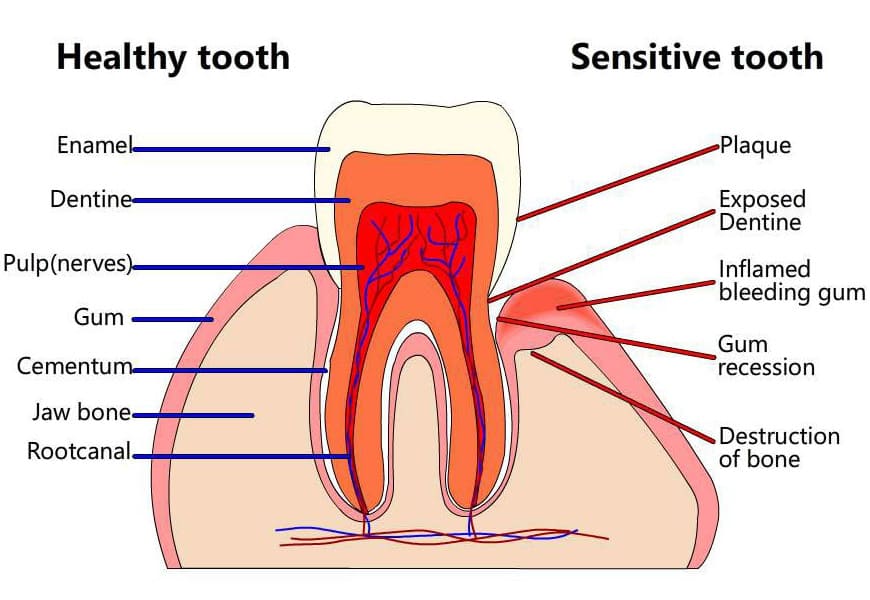Dental Health And Diet
Sugar is the main cause of dental decay when bacteria are present as it provides the environment for bacteria to grow. However, the frequency of your sugar consumption is more important than the amount of sugar you eat.
Drinking soda or juice and have a sip every few minutes over a longer period of time allows sugar to expose over a longer period of time and same is true for snacking. It is recommended that if you want to have a snack, soda, or juice, it is better to have it during meal in one sitting. Eating or drinking something sweet over an extended period of time creates a constant supply of sugar for bacteria that causes tooth decay!
It is important to be aware of all the possible sources of sugar out there. It is not just everything that is sweet, but anything that can turn to sugar and sticky in nature, like pieces of bread or noodles. Cutting down your sugar intake is good for cavity prevention as well as your overall health.
Excessive acid exposure to teeth can also weaken the enamel of teeth which is the strong outer layer of the tooth so excessive intake of citrus can irreversibly weaken your teeth which includes sucking on lemon, drinking citrus drinks or fruits like grape fruits.
-
But what about when you want to have sugar and citrus food?The best way to avoid cavities is to prevent the sugar from staying next to your teeth. Brushing after eating sugar or citrus food, rinsing your mouth with Fluoride mouth wash, or chewing sugarless gum can help. However, nothing has the effect of avoiding sugar!
-
Is there any kind of food that prevents tooth decay?Well, not really. Chewing foods like apples and carrots may have some plaque removal effects due to fibrous nature of the food, but they still contain some sugar but it is still better to eat natural fruits and vegetables as it is good for overall health.
Flouride And Decay Prevention
Years ago scientists started to notice that children who were born and raised in areas with natural fluoride in drinking water had fewer cavities than children in non-fluoridated areas. Fluoride absorbed by your body when teeth were forming (during mother's pregnancy to early childhood) integrates into the structure of enamel and makes it stronger.
-
Are there any advantages of fluoride application after teeth cleaning?After teeth eruption, fluoride found in your toothpaste, mouthwash, or what dental hygienist places on your teeth after teeth cleaning still helps in strengthening the enamel. Fluoride varnish seems to be an effective treatment for the reversal of incipient carious lesions in primary and permanent dentition. Application of fluoride after teeth cleaning helps in better exposure to plaque free tooth surfaces to remineralize enamel.
If you have children and live in an area that has no fluoride in its drinking water, you should consult your dentist and physician about fluoride tablets that are available for children.
Bad Breath
There are a few different causes of bad breath. Ranging from stomach problems, sinus problems to diet and teeth problems, most of the causes can be found in the mouth. They are:
- Tongue (when bacteria grows in between the papilla), major part of mouth bacteria stays on the tongue, so it is very important to keep your tongue clean
- Teeth cavities (especially when food particles get stuck in them)
- Lack of flossing : plaque retains in between teeth and creates bad breath
- Gum diseases
- Extraction sites during healing
- Dentures when not cleaned properly
- Alcohol and tobacco
- Dry mouth
-
How to take care of bad breath?If you or someone you know is concerned about bad breath, the first step is a dental checkup. Your dentist will be able to confirm or rule out the source of the bad breath.
When the cause is found, treatment will be determined and explained by your dentist. If the source of the bad breath is your mouth, using mouth washes, chewing gums or mints cannot treat the problem. They usually mask the problem for a short period of time, and can exacerbate the situation (some mouthwashes contain alcohol which causes dry mouth and usually make the bad breath worse).
These are a few other, non-dental reasons that cause bad breath:
- Sore throat
- Tonsillitis
- Some food such as garlic and onions
- Infection of air passages, sinusitis
Tooth Sensitivity

If you occasionally experience a sudden flash of pain, a mild tingly feeling when you bite into sour food, or drink hot or cold beverages, you may be experiencing tooth sensitivity.
Tooth sensitivity pain is not always constant; it can come and go. Constant pain could be a sign of a more serious problem. It is still important, however, to discuss your symptoms with your dentist to determine the cause and proper treatment.
-
What causes tooth sensitivity?In healthy teeth, porous tissue called dentin is protected by your teeth's hard enamel shell. Microscopic holes in the dentin, called tubules, connect back to the nerve triggering pain when irritated by certain foods and beverages. Dentin can be exposed by:
- Receding gums caused by improper brushing or gum disease.
- Fractured or chipped teeth.
- Clenching or grinding your teeth.



